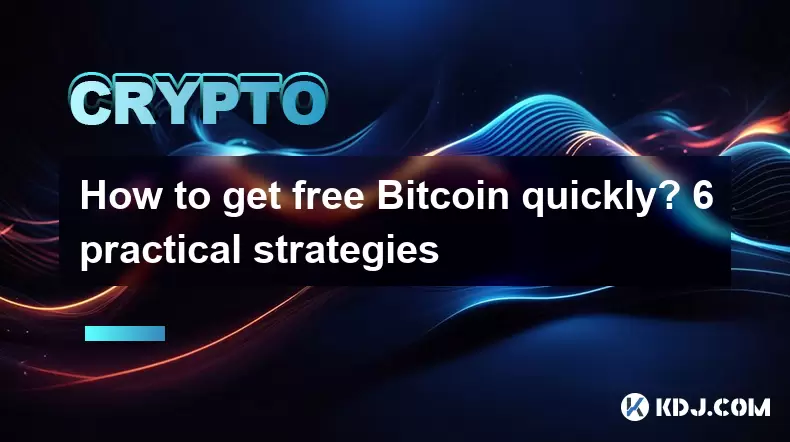-
 Bitcoin
Bitcoin $115100
1.27% -
 Ethereum
Ethereum $3675
2.71% -
 XRP
XRP $2.995
1.45% -
 Tether USDt
Tether USDt $1.000
0.02% -
 BNB
BNB $769.8
2.64% -
 Solana
Solana $168.0
3.25% -
 USDC
USDC $0.9999
-0.01% -
 TRON
TRON $0.3371
1.48% -
 Dogecoin
Dogecoin $0.2051
3.36% -
 Cardano
Cardano $0.7394
2.30% -
 Hyperliquid
Hyperliquid $38.15
0.42% -
 Stellar
Stellar $0.3966
-0.36% -
 Sui
Sui $3.486
2.93% -
 Chainlink
Chainlink $16.72
2.52% -
 Bitcoin Cash
Bitcoin Cash $568.0
4.36% -
 Hedera
Hedera $0.2440
2.59% -
 Ethena USDe
Ethena USDe $1.001
0.04% -
 Avalanche
Avalanche $22.16
2.06% -
 Litecoin
Litecoin $119.1
-0.73% -
 UNUS SED LEO
UNUS SED LEO $8.991
0.04% -
 Toncoin
Toncoin $3.232
-0.39% -
 Shiba Inu
Shiba Inu $0.00001233
2.82% -
 Uniswap
Uniswap $9.717
2.53% -
 Polkadot
Polkadot $3.664
1.85% -
 Dai
Dai $1.000
0.01% -
 Monero
Monero $281.2
-3.89% -
 Bitget Token
Bitget Token $4.350
1.55% -
 Cronos
Cronos $0.1428
5.07% -
 Pepe
Pepe $0.00001050
3.68% -
 Aave
Aave $262.3
3.54%
How to get free Bitcoin quickly? 6 practical strategies
Learn six ways to get free Bitcoin: use faucets, join airdrops, refer friends, mine, play crypto games, and earn through educational platforms.
Jun 06, 2025 at 01:01 am

In the world of cryptocurrency, the allure of obtaining free Bitcoin is strong. Many enthusiasts and newcomers alike are eager to learn how to get free Bitcoin quickly. This article will explore six practical strategies that can help you achieve this goal. Each method has its own set of steps and considerations, so let's dive in and see how you can start accumulating Bitcoin without spending a dime.
Strategy 1: Bitcoin Faucets
Bitcoin faucets are websites or apps that dispense small amounts of Bitcoin for completing simple tasks. These tasks can range from solving captchas, viewing ads, to playing games. While the amounts are small, they can add up over time.
- Choose a reputable faucet: Start by researching and selecting a trusted Bitcoin faucet. Websites like FreeBitcoin and Cointiply are popular choices.
- Complete tasks: Once you've selected a faucet, complete the tasks they offer. These are usually straightforward and don't take much time.
- Withdraw your earnings: Most faucets have a minimum withdrawal threshold. Once you reach this amount, you can transfer your earnings to your Bitcoin wallet.
Remember, the key to making the most out of Bitcoin faucets is consistency. Regularly visiting and completing tasks can help you accumulate more Bitcoin over time.
Strategy 2: Airdrops
Airdrops are another way to get free Bitcoin. These are promotional events where new cryptocurrency projects distribute free tokens to the community to raise awareness and attract users. While these are often altcoins, some projects offer Bitcoin as part of their airdrop.
- Find legitimate airdrops: Websites like Airdrop Alert and CoinMarketCap list upcoming airdrops. Ensure you verify the legitimacy of the project before participating.
- Follow the instructions: Each airdrop has specific requirements. You might need to join a Telegram group, follow the project on social media, or complete a task.
- Claim your tokens: Once you've met the criteria, you can claim your airdrop. Some projects will send the tokens directly to your wallet, while others might require you to claim them manually.
Airdrops can be a lucrative way to get free Bitcoin, but they require vigilance to avoid scams and ensure you're participating in legitimate events.
Strategy 3: Referral Programs
Many cryptocurrency platforms offer referral programs that reward you with Bitcoin for bringing in new users. These programs can be found on exchanges, wallets, and other crypto-related services.
- Sign up for a platform with a referral program: Choose a reputable platform that offers Bitcoin as a referral reward. Examples include Coinbase and Binance.
- Share your referral link: Once you're signed up, you'll receive a unique referral link. Share this link with friends, family, or on social media.
- Earn Bitcoin: When someone signs up using your link and completes the required actions (like making a trade or deposit), you'll receive a portion of Bitcoin.
Referral programs can be a passive way to earn free Bitcoin, as long as you have a network willing to use your link.
Strategy 4: Bitcoin Mining
Bitcoin mining involves using computational power to solve complex mathematical problems, which in turn validates transactions on the Bitcoin network. While mining can be profitable, it requires significant investment in hardware and electricity.
- Join a mining pool: For beginners, joining a mining pool can be more efficient than solo mining. Popular pools include Slush Pool and Antpool.
- Set up your mining rig: You'll need specialized hardware like ASIC miners. Ensure your setup is optimized for efficiency.
- Start mining: Once your rig is set up and connected to a pool, you can start mining. Earnings are typically distributed based on the pool's payout structure.
Mining can be a more technical and resource-intensive way to get free Bitcoin, but it's a direct method of earning from the network itself.
Strategy 5: Crypto Games and Apps
There are numerous crypto games and apps that reward players with Bitcoin for their time and effort. These can range from simple mobile games to more complex blockchain-based games.
- Choose a game or app: Look for games and apps that offer Bitcoin rewards. Examples include RollerCoin and Bitcoin Blast.
- Play and earn: Spend time playing the game or using the app. Earnings are usually based on your performance or time spent.
- Withdraw your earnings: Once you've accumulated enough Bitcoin, you can withdraw it to your wallet. Be aware of any withdrawal fees.
Crypto games and apps can be a fun way to earn free Bitcoin, though the amounts may be small compared to other methods.
Strategy 6: Educational Platforms
Some educational platforms offer Bitcoin as a reward for learning about cryptocurrencies. These platforms aim to educate users while incentivizing them with small Bitcoin rewards.
- Sign up for an educational platform: Platforms like Coinbase Earn and CoinMarketCap's Learn section offer Bitcoin for completing educational modules.
- Complete the courses: Follow the instructions and complete the required courses or quizzes. These are usually designed to be informative and accessible.
- Earn Bitcoin: Once you've completed the modules, you'll receive Bitcoin directly to your wallet.
Educational platforms provide a dual benefit of learning about cryptocurrencies while earning free Bitcoin.
Frequently Asked Questions
Q: Are there any risks associated with these methods?
A: Yes, each method comes with its own set of risks. Bitcoin faucets and airdrops can be susceptible to scams, so it's crucial to verify the legitimacy of the platforms you use. Mining requires significant investment and can be affected by fluctuations in Bitcoin's price. Always do thorough research before engaging in any of these strategies.
Q: How much Bitcoin can I realistically expect to earn using these methods?
A: The amount of Bitcoin you can earn varies widely depending on the method and your level of engagement. Bitcoin faucets and games might yield small amounts, while referral programs and mining could potentially offer more significant rewards. However, none of these methods will make you rich overnight.
Q: Do I need a Bitcoin wallet to use these strategies?
A: Yes, for most of these methods, you'll need a Bitcoin wallet to store your earnings. Choose a reputable wallet that suits your needs, whether it's a software wallet like Electrum or a hardware wallet like Ledger.
Q: Can I combine these strategies to maximize my earnings?
A: Absolutely, combining multiple strategies can help you earn more Bitcoin. For example, you could participate in faucets and airdrops while also referring friends to platforms and playing crypto games. Just ensure you manage your time and resources effectively.
Disclaimer:info@kdj.com
The information provided is not trading advice. kdj.com does not assume any responsibility for any investments made based on the information provided in this article. Cryptocurrencies are highly volatile and it is highly recommended that you invest with caution after thorough research!
If you believe that the content used on this website infringes your copyright, please contact us immediately (info@kdj.com) and we will delete it promptly.
- BlockDAG, Litecoin, and Cardano: Charting the Course in Crypto's Dynamic Waters
- 2025-08-07 09:09:06
- Fireverse Token: Igniting a Musical Revolution in Web3
- 2025-08-07 08:27:45
- Ethereum, L2 Withdrawals, and Decentralization: A New Yorker's Take
- 2025-08-07 08:32:33
- Avalanche vs. Ruvi AI: Daily Sales Tell a Story of Crypto Disruption
- 2025-08-07 06:29:35
- DeSoc: The Crypto to Buy Now for a Decentralized Future (and Maybe 43x Gains!)
- 2025-08-07 06:50:16
- Arctic Pablo Coin: Riding the Meme Coin Wave with a Deflationary Twist
- 2025-08-07 07:18:13
Related knowledge

What is Chainlink (LINK)?
Jul 22,2025 at 02:14am
Understanding Chainlink (LINK): The Decentralized Oracle NetworkChainlink is a decentralized oracle network designed to bridge the gap between blockch...

What is Avalanche (AVAX)?
Jul 22,2025 at 08:35am
What is Avalanche (AVAX)?Avalanche (AVAX) is a decentralized, open-source blockchain platform designed to support high-performance decentralized appli...

What is Polkadot (DOT)?
Jul 19,2025 at 06:35pm
Understanding the Basics of Polkadot (DOT)Polkadot (DOT) is a multi-chain network protocol designed to enable different blockchains to transfer messag...

What is Litecoin (LTC)?
Jul 23,2025 at 11:35am
Overview of Litecoin (LTC)Litecoin (LTC) is a peer-to-peer cryptocurrency that was created in 2011 by Charlie Lee, a former Google engineer. It is oft...

What is Monero (XMR)?
Jul 21,2025 at 10:07am
What is Monero (XMR)?Monero (XMR) is a decentralized cryptocurrency designed to provide enhanced privacy and anonymity for its users. Unlike Bitcoin a...

How to add indicators to Ethereum chart on TradingView?
Jul 19,2025 at 07:15am
What Is an Ethereum Chart on TradingView?The Ethereum chart on TradingView is a visual representation of the price movement of Ethereum (ETH) over a s...

What is Chainlink (LINK)?
Jul 22,2025 at 02:14am
Understanding Chainlink (LINK): The Decentralized Oracle NetworkChainlink is a decentralized oracle network designed to bridge the gap between blockch...

What is Avalanche (AVAX)?
Jul 22,2025 at 08:35am
What is Avalanche (AVAX)?Avalanche (AVAX) is a decentralized, open-source blockchain platform designed to support high-performance decentralized appli...

What is Polkadot (DOT)?
Jul 19,2025 at 06:35pm
Understanding the Basics of Polkadot (DOT)Polkadot (DOT) is a multi-chain network protocol designed to enable different blockchains to transfer messag...

What is Litecoin (LTC)?
Jul 23,2025 at 11:35am
Overview of Litecoin (LTC)Litecoin (LTC) is a peer-to-peer cryptocurrency that was created in 2011 by Charlie Lee, a former Google engineer. It is oft...

What is Monero (XMR)?
Jul 21,2025 at 10:07am
What is Monero (XMR)?Monero (XMR) is a decentralized cryptocurrency designed to provide enhanced privacy and anonymity for its users. Unlike Bitcoin a...

How to add indicators to Ethereum chart on TradingView?
Jul 19,2025 at 07:15am
What Is an Ethereum Chart on TradingView?The Ethereum chart on TradingView is a visual representation of the price movement of Ethereum (ETH) over a s...
See all articles

























































































